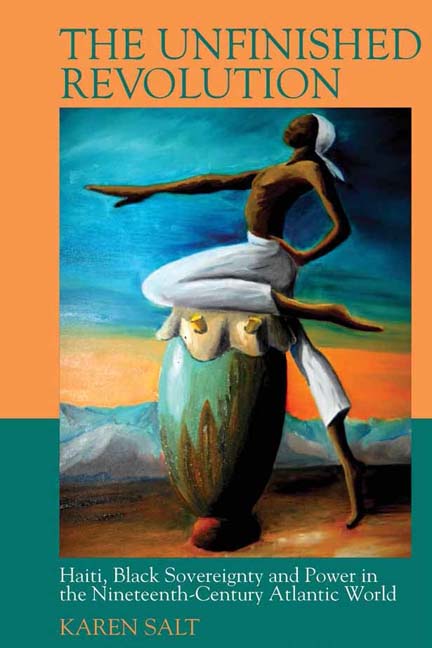 The Unfinished Revolution
The Unfinished Revolution Book contents
- Frontmatter
- Contents
- List of Figures
- Acknowledgements
- Introduction: Sovereignty and Power
- 1 Games of Sovereignty and Opportunity
- 2 Selling Citizenship, Recognising Blood, Stabilising Sovereignty
- 3 Burlesquing Empire: Performing Black Sovereignty on the World Stage
- 4 Welcome to the New World Order: Haiti and Black Sovereignty at the Turn of the Century
- 5 Sovereignty under Siege? Contemporary Performances of Black Sovereignty
- Bibliography
- Index
5 - Sovereignty under Siege? Contemporary Performances of Black Sovereignty
- Frontmatter
- Contents
- List of Figures
- Acknowledgements
- Introduction: Sovereignty and Power
- 1 Games of Sovereignty and Opportunity
- 2 Selling Citizenship, Recognising Blood, Stabilising Sovereignty
- 3 Burlesquing Empire: Performing Black Sovereignty on the World Stage
- 4 Welcome to the New World Order: Haiti and Black Sovereignty at the Turn of the Century
- 5 Sovereignty under Siege? Contemporary Performances of Black Sovereignty
- Bibliography
- Index
Summary
Introduction
Haiti's initial invitation to the World's Columbian Exposition of 1893 coincided with another moment of expansion and control: diplomatic negotiations between the USA and Haiti for control of a particular harbour in the north-western corner of the republic—the Môle-Saint-Nicolas. Although acknowledged by all parties that the harbour remained under the clear sovereign control of Haiti, the area nevertheless continued to play a starring role in the USA's plans for control of the shipping lanes leading to the proposed isthmus canal on the mainland. Haitian diplomat Hannibal Price highlights this harbour in The Haytian Question, noting that it pointed “like a cannon upon what must necessarily be the European line [or American coal-fuelling stopover point] to the inter-oceanic canal, whether this be completed at Panama, or eventually, at Nicaragua.” So central was this harbour to US expansion efforts that abolitionist, activist and writer Frederick Douglass, in his role as US Minister Resident to Haiti, potentially tried to influence the intense diplomatic negotiations with Haiti’s Foreign Minister Anténor Firmin over the USA acquiring (or even leasing) this harbour. Rather than put undue pressure on Firmin through the use of force or coercion—such as that displayed by other US officials during the negotiations—Douglass extended an invitation to Haitian President Hyppolite to the Chicago World's Fair from US President Harrison. As a fleet of US gunships patrolled the Haitian bay on supposed “routine” manoeuvres, Haitian leaders’ stance in the negotiations did not change. Firmin responded to the USA's “request” to acquire Haitian territory with a firm “no.” The Fair invitation prompted a different response: Haitian officials enthusiastically agreed to participate.
US newspapers, at the time, described Douglass as more Haitian than American after negotiations for the harbour broke off; although they used this description as a way of linking the failure successfully to negotiate the acquisition of the harbour to Douglass's racial connections with (black) Haiti. In these claims, Douglass did not fight for US interests, but for those of his racial kin. Supportive of Haiti and emboldened by what its presence meant for the futures of people of African descent in the Atlantic world, Douglass was equally supportive of the USA's right to acquire territory and “foothold[s]” in the Caribbean—bringing the USA in line with “every other great nation in the world.”
- Type
- Chapter
- Information
- The Unfinished RevolutionHaiti, Black Sovereignty and Power in the Nineteenth-Century Atlantic World, pp. 191 - 212Publisher: Liverpool University PressPrint publication year: 2019


